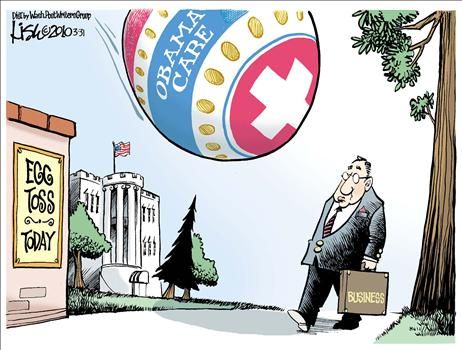.... In 2003, when President Bush expanded federal coverage for elderly Americans’ prescription drugs, he also included a subsidy so businesses would keep retirees in their private drug benefit plans. The payout was about $665 per employee each year they were kept on private coverage. The goal was to keep employers from dumping retirees into the newly expanded government plan.
Last week, Obama and the Democrats in Congress removed the subsidy’s tax-free status. Because of how the Securities and Exchange Commission regulates large companies, this change in the long-term tax outlook for the businesses is sending shockwaves through their ledgers. Here's what a few companies are saying:
- AT&T announced the change would cost them $1 billion.
- Caterpillar said it would cost them $100 million.
- Prudential also said they will feel a $100 million impact.
- AK Steel put the loss at $31 million.
- Verizon warned its employees ObamaCare “may have significant implications for both retirees and employers.”
- Illinois Tool Works announced a $22 million hit.
All told, companies are reporting a new $14 billion tax liability under ObamaCare, and we’re only a week out from the signing ceremony.
Never one to let a political opportunity slip by, House Energy and Commerce Committee Chairman Henry Waxman (D-Calif.) is summoning the afflicted companies to a hearing on Capitol Hill. Apparently, Waxman is shocked that the health care takeover bill he just voted for is having real-life implications for businesses. Waxman is demanding internal company documents on how the companies arrived at their figures. It should provide uproarious political theater as the Beverly Hills politician tries to blame the private sector for the impacts of bad policy he just implemented.
Of course the companies could always avoid the new tax by kicking retirees off the private drug plan; I’m sure ObamaCare would be all too happy to take them in. The Employee Benefit Research Institute projects this would save employers $2,800 in future costs per beneficiary. Who could blame them for trying to avoid the huge hit to their books?...
...(read more)...
